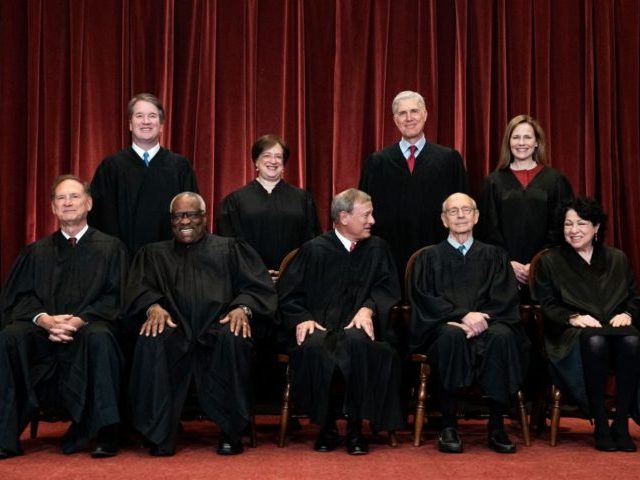In a case alleging that police seized a man’s firearms while he was at hospital for a psychiatric evaluation, the U.S. Supreme Court held in a unanimous 9-0 decision that entering the house without a search warrant violates the Fourth Amendment to the Constitution.
The Court’s opinion, written by Justice Clarence Thomas, explains that the petitioner “denied that he was suicidal,” but that respondents thought the “petitioner posed a risk to himself or others.”
Therefore, “they called an ambulance, and petitioner agreed to go to the hospital for a psychiatric evaluation — but only after respondents allegedly promised not to confiscate his firearms.”
“Once the ambulance had taken petitioner away, however, respondents seized the weapons,” the Court’s opinion explains. “Guided by petitioner’s wife — whom they allegedly misinformed about his wishes — respondents entered the home and took two handguns.”
The petitioner reacted by suing, claiming “respondents violated the Fourth Amendment when they entered his home and seized him and his firearms without a warrant.”
On Monday, the U.S. Supreme Court unanimously decided that the police entering the house without a search warrant violates the Fourth Amendment to the Constitution.
“The Fourth Amendment protects ‘[t]he right of the people to be secure in their persons, houses, papers, and effects, against unreasonable searches and seizures,'” notes the Court’s opinion.
“The ‘very core’ of this guarantee is ‘the right of a man to retreat into his own home and there be free from unreasonable governmental intrusion,'” the opinion continued. “To be sure, the Fourth Amendment does not prohibit all unwelcome intrusions ‘on private property’ — only ‘unreasonable’ ones.”
Therefore, the Court has recognized “a few permissible invasions of the home and its curtilage. Perhaps most familiar, for example, are searches and seizures pursuant to a valid warrant.”
“We have also held that law enforcement officers may enter private property without a warrant when certain exigent circumstances exist, including the need to ‘render emergency assistance to an injured occupant or to protect an occupant from imminent injury,'” the opinion added.
The First Circuit had affirmed that a theory that the officers’ removal of the petitioner and his firearms from his home was justified by a “community caretaking exception” to the warrant requirement.
But Justice Thomas said the First Circuit’s “‘community caretaking'” rule “goes beyond anything this Court has recognized.”
Justice Samuel Alito concurred, writing, “I entirely agree — that there is no special Fourth Amendment rule for a broad category of cases involving ‘community caretaking.'”
“As I understand the term, it describes the many police tasks that go beyond criminal law enforcement. These tasks vary widely, and there is no clear limit on how far they might extend in the future,” the Supreme Court justice continued.
“The category potentially includes any non-law-enforcement work that a community chooses to assign, and because of the breadth of activities that may be described as community caretaking, we should not assume that the Fourth Amendment’s command of reasonableness applies in the same way to everything that might be viewed as falling into this broad category,” Alito added.
The case is Caniglia v. Strom ET AL., No. 20–157 in the Supreme Court of the United States.
You can follow Alana Mastrangelo on Facebook and Twitter at @ARmastrangelo, and on Instagram.

COMMENTS
Please let us know if you're having issues with commenting.